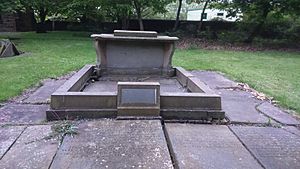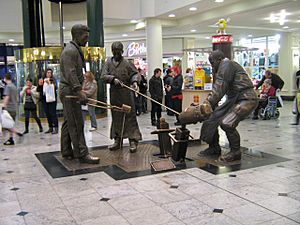Benjamin Huntsman facts for kids
Benjamin Huntsman (born June 4, 1704 – died June 20, 1776) was a clever inventor from England. He created a special way to make a very strong type of metal called crucible steel. This invention changed how tools and other metal items were made.
Contents
Early Life and Work

Benjamin Huntsman was born in a place called Epworth, in Lincolnshire. His parents, William and Mary, were farmers and part of a religious group called the Quakers.
Benjamin started his career in Doncaster, Yorkshire. He was skilled at making clocks, locks, and tools. People trusted him so much that he even helped with eye problems and tried out new medical ideas.
The Invention of Cast Steel
Huntsman was very interested in making better steel. He began experimenting in Doncaster. In 1740, he moved to Handsworth, near Sheffield, which was a big center for metalwork.
After many tries, Benjamin finally found a way to make excellent cast steel. He used special clay pots called crucibles. Each pot held about 34 pounds of steel that had already been partly processed.
He added a special powder called a flux. Then, he covered the pots and heated them with coke (a type of fuel) for about three hours. When the steel melted, he poured it into molds. The clay pots could be used again.
The very first item made with Huntsman's new cast steel was a tall clock. You can still see it today at the Kelham Island Museum in the Enid Hattersley Gallery.
Sharing His Discovery
At first, the local toolmakers in Sheffield didn't want to buy Huntsman's new steel. They thought it was too hard compared to the German steel they usually used. So, for a long time, Huntsman sold all his steel to France.
However, French tools made with Huntsman's strong steel started to compete with Sheffield's own products. The Sheffield toolmakers realized they needed to use this new steel to stay in business.
Benjamin Huntsman never patented his special process. This meant anyone could try to figure out his secret. A man from Sheffield named Walker supposedly discovered it by pretending to be a poor beggar. He asked to sleep by the fire in Huntsman's workshop for a night.
Later Years and Legacy
In 1770, Huntsman moved his steel-making business to Attercliffe. He continued to be very successful until he passed away in 1776. He was buried in the Hilltop Cemetery in Attercliffe Common.
His son, William Huntsman, took over the business and continued his father's work.
Today, Benjamin Huntsman is remembered in Sheffield. One of the main buildings at the Northern General Hospital is named after him. There's also a pub in the city center called The Benjamin Huntsman.
Images for kids
-
Benjamin Huntsman's tomb, in the graveyard of Attercliffe Chapel
 | Jackie Robinson |
 | Jack Johnson |
 | Althea Gibson |
 | Arthur Ashe |
 | Muhammad Ali |




